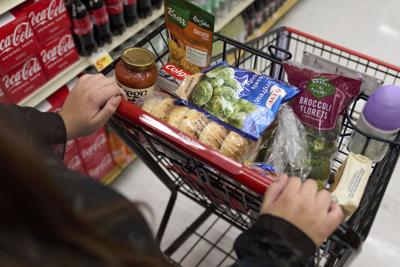Every month, Missouri’s Department of Social Services delivers a document to a federal judge explaining how bad the state is at providing food to poor people. The news is nearly always the same.
Too many people trying to get food stamps through the federal Supplemental Nutrition Assistance Program can’t even get an interview to be approved for the aid. They have to stay on hold, dealing with a broken call center, often for hours at a time.
That was the experience Mary Holmes had back in 2021, when the ӣ����Ƶ resident was trying to figure out why she had been wrongly canceled from the SNAP program. Holmes lives on federal disability checks and helps take care of her grandchildren.
One day, she waited on hold for four hours and still had nearly 700 people waiting in front of her.
“It’s really depressing and frustrating,” she told me then.
People are also reading…
Holmes became the lead plaintiff in a federal lawsuit filed by Legal Services of Eastern Missouri, Empower Missouri, the Stinson Law Firm and the National Center for Law and Economic Justice. A year ago, U.S. District Judge Doug Harpool ruled in the plaintiffs’ favor. He determined that Missouri was violating federal law by failing to properly operate the SNAP program and making it nearly impossible for some people to access the aid.

A year ago, U.S. District Judge Doug Harpool ruled that Missouri was violating federal law by failing to properly operate the Supplemental Nutrition Assistance Program. In May, after the state made no progress in fixing the problem, Harpool ordered Missouri to take specific measures to improve service.
In May, after the state made no progress in fixing the problem, Harpool to take specific measures to improve service.
There is still little progress.
“We’ve not seen significant improvement yet,” says Katie Deabler, an attorney with the . “The call center is not functional enough for people to be able to efficiently get in and speak to a person.”
The state’s own reports tell the story. In May, the average wait time at the call center was 45 minutes. The maximum wait time was more than five hours. More than 11,000 people were disconnected before they could get to a live person. Another 10,000 hung up after waiting so long.
The result is that people who qualify for food stamps can’t get them.
The last report was filed with the court on July 7. That was three days after President Donald Trump signed passed by Republicans in Congress that calls for massive cuts to the SNAP program and Medicaid to pay for tax cuts that primarily benefit wealthy Americans.
The bill is going to make problems in Missouri — and other states — much worse by creating new bureaucratic hurdles, on top of the ones they already can’t navigate.
The bill doesn’t change any of the SNAP legal requirements, Deabler says. But it adds new paperwork and bureaucracy, such as more stringent work requirements, that will lead to even longer wait times and more people not getting the help they qualify for.
“For the first time in history, states are going to have to shoulder more of the costs,” Deabler says.
Until now, the program has been fully funded by the federal government. “It’s definitely a concern that states that are already strapped in terms of their SNAP budgets are going to have more responsibilities,” she says.
Missouri has complained in the federal court case that it doesn’t have the resources to replace old technology and hire enough staff to better operate the SNAP program. So Judge Harpool, a former Missouri lawmaker, scheduled a hearing in which he invited lawyers or representatives from the governor’s office and the House and Senate appropriations committees to explain how they might meet the requirements of federal law. Only the governor’s office showed up.
Harpool wasn’t happy.
“Defendant’s ‘promises’ that it is doing the best it can in its administration of SNAP and in its compliance with ADA are both too little and too late to be credible. The current efforts do not fulfill Defendant’s responsibilities under federal law,” the judge wrote in his order requiring substantial improvements within six months. “Defendant has had multiple opportunities to seek additional resources or make administrative or technological changes, yet thus far none have been forthcoming.”
Missouri has appealed Harpool’s rulings. No matter the outcome, the cuts and budget shifts in the bill passed by Congress all but guarantee that things are going to get worse before they get better.
Holmes, the lead plaintiff in the case, ended up getting her SNAP approvals shortly after the lawsuit was filed. So did many of the other plaintiffs. But what about the thousands of food-challenged Missourians who are waiting on hold for hours while billionaires get tax cuts?
Let them eat cake.
House Republicans propelled President Donald Trump’s $4.5 trillion tax breaks and spending cuts bill to final congressional passage Thursday, overcoming multiple setbacks to approve his signature second-term policy package before a Fourth of July deadline.








